Are you tired of your Samsung refrigerator freezer not getting cold enough, leaving your perishables at risk? How can you solve this issue and keep your food fresh?
Fear not! In this article, we’ll explore the possible reasons behind a Samsung refrigerator freezer not getting cold, as well as some troubleshooting tips and solutions to help you restore your appliance’s performance.
So, if you’re experiencing this issue, read on to learn how to address it and get your freezer back to its optimal temperature.
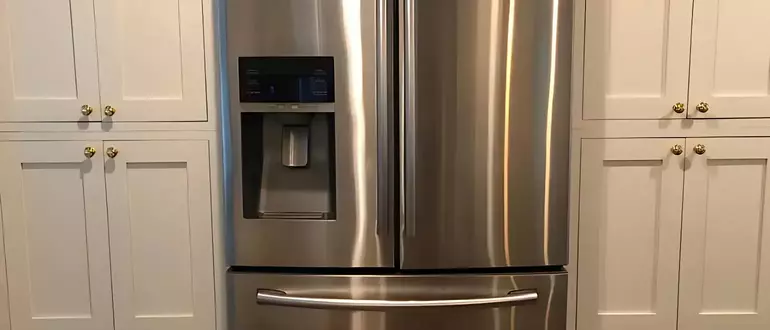
Why Samsung Refrigerator Not Getting Cold?
There can be several reasons why your Samsung refrigerator is not getting cold.
Let’s explore some possible causes and steps you can take to troubleshoot the issue.
Check the Thermostat Settings
Begin by examining your freezer’s thermostat settings. You may have accidentally set the temperature too high or the control may have been bumped inadvertently.
Adjust the temperature to the recommended setting, usually between -18°C and -20°C (0°F and -4°F), and wait a few hours to see if the problem resolves.
Inspect the Door Seal
A compromised door seal can cause cold air to leak out of your freezer. Inspect the seal for any signs of damage, such as cracks or gaps.
Clean the seal with a mild detergent and warm water to remove any debris that may be preventing a proper seal. If the seal is damaged, you’ll need to replace it.
Examine the Condenser Coils
Dusty or dirty condenser coils can impede your freezer’s cooling efficiency. Unplug your refrigerator and locate the coils, which are typically found on the back or
bottom of the unit. Use a vacuum or a soft brush to clean away any dust and debris. Remember to plug the refrigerator back in once you’re done.
Evaluate the Evaporator Fan
The evaporator fan is responsible for circulating cold air throughout your freezer. Unplug your refrigerator and access the evaporator fan, usually found behind a panel
in the freezer compartment. Check for any obstructions, and make sure the fan spins freely. If the fan is not working, you may need to replace it.
Assess the Defrost System
If your freezer is not defrosting properly, ice buildup can block the airflow and prevent cooling.
Check the defrost timer, defrost heater, and defrost thermostat for any malfunctions. If any of these components are faulty, you’ll need to replace them.
The Importance of Proper Temperature Settings for Optimal Performance
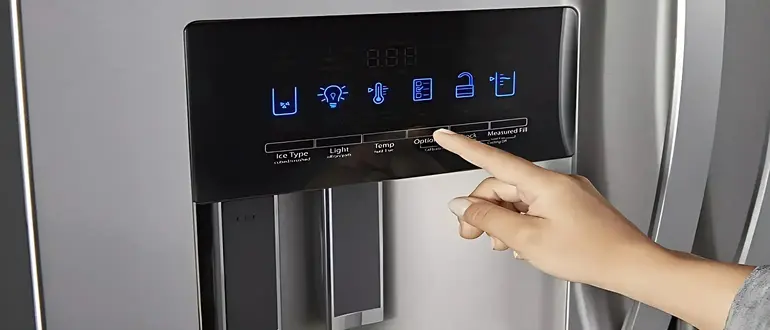
It is essential to maintain proper temperature settings in your Samsung refrigerator freezer to ensure optimal performance, food safety, and energy efficiency.
Here are some key points to consider when dealing with temperature settings in your Samsung refrigerator freezer:
Recommended Temperature Settings
For the refrigerator, it’s best to set the temperature between 35°F (2°C) and 38°F (3°C).
For the freezer, the ideal temperature range is -4°F (-20°C) to 0°F (-18°C). Maintaining these temperatures will help preserve the freshness and quality of your food.
Temperature Consistency
Ensuring consistent temperatures in your refrigerator freezer is crucial for preventing food spoilage and promoting energy efficiency.
Fluctuating temperatures can lead to increased energy consumption and may compromise the performance of your appliance.
Food Safety Concerns
Proper temperature settings are essential for preventing the growth of harmful bacteria in your food.
Bacteria can multiply rapidly at temperatures above 40°F (4°C) in the refrigerator and can lead to foodborne illnesses.
Energy Efficiency
Maintaining the recommended temperature settings will help your Samsung refrigerator freezer operate more efficiently, saving energy and reducing your monthly utility bills.
Incorrect temperature settings can cause your refrigerator to work harder, which can increase energy consumption and wear on the appliance.
Check the User Manual
Refer to your Samsung refrigerator freezer’s user manual for specific temperature setting recommendations and troubleshooting tips.
This will ensure that you are using your appliance according to the manufacturer’s guidelines.
Regular Maintenance

Periodically inspect your refrigerator’s door seals, coils, and vents to ensure they are clean and functioning properly.
This will help maintain the desired temperature settings and extend the life of your appliance.
If you find that your Samsung refrigerator freezer is not getting cold despite having the proper temperature settings, there could be several reasons for this, including:
- Blocked air vents: Ensure that the air vents are not blocked by food items or debris. This can obstruct airflow and affect the appliance’s cooling capacity.
- Faulty thermostat: If the thermostat is not functioning correctly, it may not regulate the temperature properly, resulting in a too-warm or too-cold refrigerator freezer.
- Malfunctioning evaporator or condenser fan: These fans help circulate the cold air in the refrigerator freezer. If they are not functioning correctly, the temperature inside the appliance may not be maintained.
- Dirty condenser coils: Dirty or clogged condenser coils can reduce the efficiency of your refrigerator freezer and lead to temperature issues.
- Refrigerant leak: A refrigerant leak can cause your refrigerator freezer to lose its cooling capacity.
If you cannot identify or resolve the issue on your own, it is best to consult a professional appliance technician to diagnose and repair the problem.
The Impact of a Damaged Compressor on Your Freezer’s Cooling Capability
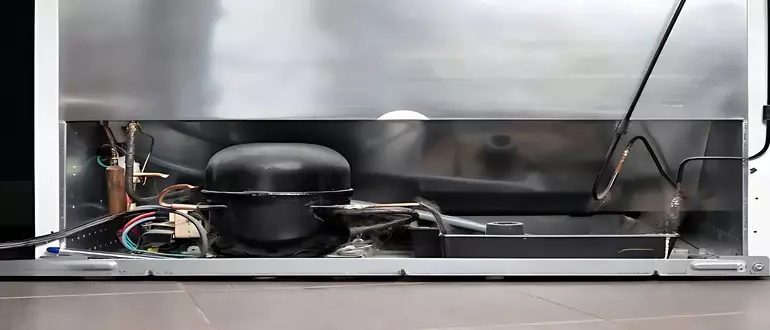
A damaged compressor can have a significant impact on your Samsung refrigerator freezer’s cooling capability.
The compressor is a vital component of your appliance, as it is responsible for circulating refrigerant throughout the system, thereby maintaining the desired temperature levels.
If the compressor is damaged or not functioning properly, it can lead to several issues affecting your freezer’s cooling performance.
Inadequate Cooling
A damaged compressor may not be able to maintain the necessary pressure levels for the refrigerant to effectively absorb heat from the freezer’s interior.
This can result in the freezer failing to reach the desired temperature, leading to inadequate cooling and potential spoilage of your stored food items.
Increased energy consumption: If the compressor is not functioning efficiently, it will need to work harder to maintain the desired temperature levels. This can result in increased energy consumption and higher utility bills.
Overheating
A damaged compressor can cause your refrigerator freezer to overheat, as it struggles to maintain the desired temperature.
Overheating can cause additional damage to other components, reduce the overall efficiency of the appliance, and may even pose a safety risk.
Frequent Cycling
A damaged compressor may cause your refrigerator freezer to cycle on and off more frequently than normal.
This can lead to inconsistent temperature levels inside the appliance, reducing the overall effectiveness of the cooling process.
Noisy Operation
A malfunctioning compressor can cause your refrigerator freezer to produce excessive noise during operation.
This can be an indicator that the compressor is struggling to maintain the desired temperature levels, or that it is on the verge of failing.
Complete Failure
In some cases, a damaged compressor can fail, leading to a complete loss of cooling capability in your refrigerator freezer.
In this situation, you may need to replace the compressor or consider purchasing a new appliance.
If you suspect that your Samsung refrigerator freezer’s compressor is damaged or not functioning correctly, it is essential to address the issue promptly.
Consult your appliance’s user manual for troubleshooting tips, and if necessary, contact a professional appliance technician to diagnose and repair the problem.
Regular maintenance, such as cleaning the condenser coils and checking the door seals, can also help to prevent compressor-related issues and extend the life of your refrigerator freezer.
When to Call a Professional for Your Samsung Refrigerator Freezer Issues
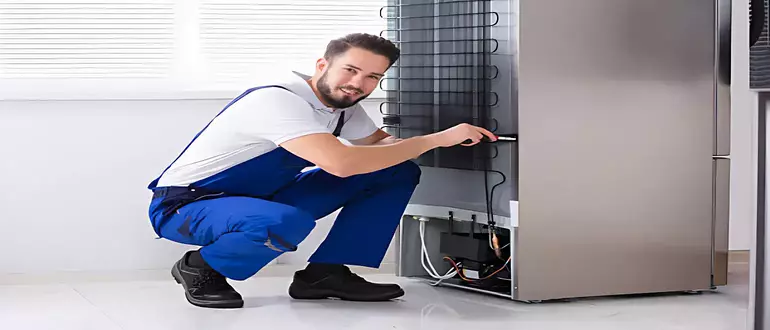
While some Samsung refrigerator freezer issues can be resolved through simple troubleshooting and maintenance, there are instances when it’s best to call a
professional for help. Here are some situations when you should consider reaching out to an appliance technician:
Insufficient Cooling
If your refrigerator freezer is not maintaining the desired temperature even after adjusting the settings, cleaning the condenser coils, and ensuring proper air circulation, it’s time to call a professional.
Noisy Operation
Unusual or loud noises coming from your refrigerator freezer can indicate a problem with the compressor, motor, or other internal components. An appliance technician can identify and resolve the issue.
Water Leaks
If you notice water leaking from your refrigerator freezer or pooling around the appliance, it could be due to a damaged door seal, clogged defrost drain, or malfunctioning water supply line. A professional can pinpoint and fix the problem.
Frost Buildup
Excessive frost buildup in your freezer could be caused by a malfunctioning defrost system or a damaged door seal.
An appliance technician can diagnose and repair the issue, preventing potential damage to your appliance.
Electrical Issues
If you suspect an electrical problem, such as flickering lights, tripped breakers, or power fluctuations, it’s best to call a professional for a thorough assessment and repair.
Unresponsive Controls or Display
If the controls or display on your Samsung refrigerator freezer are not functioning correctly or are unresponsive, a technician can determine the cause and fix the issue.
The Refrigerator Freezer not Working at All
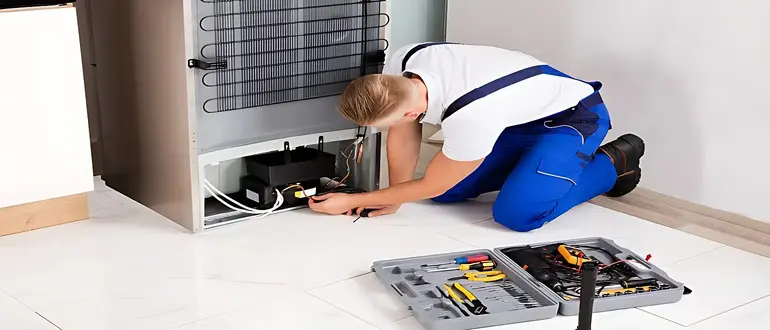
If your refrigerator freezer is not running or has completely stopped working, it’s essential to call a professional to diagnose and repair the problem as soon as possible.
Repeated Problems
If you have attempted DIY troubleshooting and repairs but continue to face the same or similar issues, it’s time to call a professional to assess and resolve the problem once and for all.
Warranty Coverage
If your Samsung refrigerator freezer is still under warranty, it’s best to contact an authorized service center to address any issues. Attempting to repair the appliance yourself may void the warranty.
FAQs
Why Is My Samsung Refrigerator Freezer Not Getting Cold Enough?
Several factors can contribute to your refrigerator freezer not getting cold enough, such as incorrect temperature settings, blocked air vents, dirty condenser coils, a faulty thermostat, or a malfunctioning evaporator or condenser fan.
What Temperature Should I Set My Samsung Refrigerator Freezer Too?
The ideal temperature for the refrigerator compartment is between 35°F (2°C) and 38°F (3°C), while the freezer should be set between -4°F (-20°C) and 0°F (-18°C) for optimal performance and food preservation.
Can A Damaged Compressor Cause Cooling Issues In My Samsung Refrigerator Freezer?
Yes, a damaged compressor can lead to insufficient cooling, increased energy consumption, overheating, frequent cycling, noisy operation, or complete failure of your refrigerator freezer’s cooling capability.
Final Words
Addressing the issue of your Samsung refrigerator freezer not getting cold is crucial for maintaining food freshness and avoiding spoilage.
By following the expert guidance provided in this article, you can effectively troubleshoot and resolve the problem.
Remember, periodic maintenance and staying vigilant for any signs of temperature inconsistencies can help prevent future issues.
With the right knowledge and care, you can ensure that your Samsung refrigerator freezer remains a reliable and efficient appliance in your kitchen.
